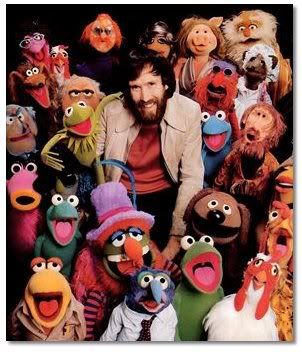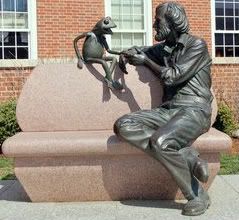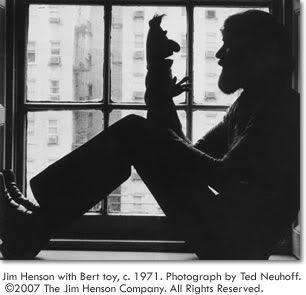Jim Henson (1936-1990): Saying Goodbye 20 Years Later
Twenty years ago, the world lost Jim Henson. I was four years old at the time, but I remember learning about his death a few months later on the television special “The Muppets Celebrate Jim Henson.” While in college years later, I purchased a bootleg of the broadcast on eBay and it’s always been one of my most prized possessions.
Jim Henson has always been my biggest influence. While movies like Star Wars and Jaws made me want to make movies, and Kevin Smith showed me that it’s possible to make it with just a cheap camera and your friends, Jim Henson taught me that anything was possible. It’s hard to reflect on a person who I never met and who died before I was out of pre-school. I could use my assumptions and write about his importance and influence on the entertainment industry, but first I want to talk about his influence and importance to me.

I was born about a year before my parents were married. They didn’t have a place to live at the time so the first year-and-a-half was spent at my mom’s parent’s house. While she went to work, my grandfather would baby-sit me and had me watch Sesame Street and The Muppet Show reruns. I’ve always loved the Muppets. As far back as pre-school I remember watching many Sesame Street VHS tapes. I’d listen to songs like Ladybug Picnic, Alligator King and Telephone Rock roughly three times a day and wore through the VHS tapes to the point where they could no longer play.
Perhaps it was because of that first year of my life that I developed a very close relationship with my grandfather. Our family would have parties and while everyone was drinking and watching football, I’d hang out with my grandpop in his music room. We’d listen to old jazz records, he’d play his banjo, and we’d always watch either the Marx Brothers, Mel Brooks or Muppet films. The Muppets helped shape my concept of comedy and their influence is noticeable in multiple comedians and comedy writers ranging from comedy troupes like The State and Stephen Lynch to directors like Lloyd Kaufman and Kevin Smith. Comedian Chris Hardwick even referred to the Muppets as one of his two biggest influences on the twelfth episode of his podcast “The Nerdist” (The following episodes his guests WERE The Muppets).
I come from a family (at least on my mother’s side) where everyone is a musician. When we’d have parties, there were always different family members performing songs. But the show stopper was when my Uncle Tommy (who was an amateur stand-up comedian/impersonator) would get a Kermit the Frog puppet and sing Rainbow Connection while my grandfather played banjo. Still, somewhere around junior high I really stopped caring about Jim Henson and the Muppets. It wasn’t like I stopped liking them – I just never thought about them any more. It wasn’t until my grandfather’s death in 2001 when they reentered my mind. The day after his funeral, I turned on the TV and was greeted by Kermit the Frog singing Rainbow Connection in the opening credits of The Muppet Movie. I immediately broke down crying. This brutal moment had reopened a door into the world of Jim Henson for me.
Every person who’s ever worked with Henson says the same thing when they’re interviewed about him: He was friendly, funny and always coming up with new ideas. In a world where it feels like every movie is full of CGI and 3-D effects, we sometimes forget how wonderful the practical effects of the past were. While movies like Deep Blue Sea and the Star Wars prequels look cheesy and dated already, a movie like Labyrinth still shines with fantastical wonderment.
It’s easy for me to say that Jim Henson is the reason I write or direct or do comedy. What people forget are the other things that Henson inspired in us and taught us. He taught many of us how to read and write through his characters on Sesame Street (and his legacy has continued to educate long after his death). He taught us to love each other, to care about each other, to believe in ourselves and of the unlimited powers of our imagination.

What always made things work for Henson was the way he depicted his characters. They were human – legit real creations – that were so much more than just pieces of felt and ping pong balls. When you watch the Muppet Show, you identify with these characters, be it the glamorous Miss Piggy, the misunderstood Gonzo, the stuggling artist Fozzie, the always relaxed Rowlf, or Kermit, who has the most daunting task of all the Muppets: struggling to keep everything together. I sincerely believe that everyone can be connected with a Muppet. But what made these characters so special and such an impact on generations of people young and old were the ways that they interacted with each other. They fought and they performed, but at the end of the day, they cared about each other. The Muppeteers were friends, and those friendships came through in the characters.
There’s a song lyric that has always made me think of Henson. The lyric is from the song “Pure Imagination” from the 1973 film “Willie Wonka and the Chocolate Factory”: “If you want to view paradise/Simply look around and view it/Anything you want to do/Want to change the world, there’s nothing to it.” Jim Henson made the world believe that anything was possible. He created wonderfully elaborate worlds in his films. He made us all believe that as long as we believed in ourselves, we would succeed. He was the living example of following your dreams.
Jim Henson started his career on public access television with Sam & Friends, a show that almost immediately oozed Jim’s trademark off-key brand of humor and introduced future classic characters like Kermit and Rowlf the Dog. While producing the show, Henson started to experiment with techniques that forever changed the way puppetry was performed on television. Until that point, it had always been a ventriloquist act, but Henson used monitors and raised sets in order to allow puppeteers to hold puppets over their heads and watch their performances on the screens. He made a living using the puppets to make commercials, appear on talk show appearances and even directed an award-winning short film called Time Piece. However it was when Joan Ganz Cooney and the team at the Children’s Television Workshop approached him about their educational show Sesame Street that Henson truly got to shine.

It was there that Henson began to build a legacy with a new version of Kermit the Frog, in addition to Oscar the Grouch, Bert and Ernie, Cookie Monster and Big Bird – just to name a few. Henson always downplayed his role in the success of the show, but Cooney frequently praised his work and the Public Broadcast Service called him “the spark that ignited our fledgling broadcast service.”
Henson worried that he’d be typecast as only a children’s entertainer and began producing a series of adult sketches for Saturday Night Live, but the writers were not fans. Michael O’Donoghue famously stated, “I don’t write for felt.” It was from there that the groundbreaking Muppet Show began to grow. American Networks mostly rejected the series, feeling that the Muppets could only appeal to children, but it was with the help of a media mogul named Lew Grade that the show got made. Like most great shows, it was a slow burn to its popularity. But in 1979, Henson made The Muppet Movie, which became the 61st highest-grossing movie of all time and made the song Rainbow Connection a radio hit as well as the song most attributed to the Muppets.
The fame didn’t hold up forever, however. After the box office failure of Labyrinth and the low ratings for his television shows The Storyteller and The Jim Henson Hour, Henson began negotiations to sell the company to the Walt Disney Company to save the Muppets and give him more time on the creative side of show. Less than a year later, Henson began feeling flu-like symptoms and started feeling sick and constantly tired. Early on May 15, 1990, he was having trouble breathing and began coughing up blood. His ex-wife Jane Henson was by his side and she claimed in an interview with People Magazine that Jim thought he may be dying but didn’t want to bother going to the hospital. Jane said this was likely due to his desire to “not be a bother to people.” The following day, Henson died of pneumonia.
Someone recently put the entire funeral service on YouTube. While this might be a morbid thing, it’s an incredibly touching memorial filled with Dixieland music, singing, laughing and personal stories of favorite moments with Jim. There’s this constant struggle between great sadness and intense happiness for a great man who most of us never met. Many of the comments expressed a feeling of sorrow, as if they lost a close friend and not just a random celebrity. I completely identify with those sentiments, as there has never been another celebrity whose death has left such a feeling of emptiness inside me like Jim Henson’s passing.
In the last few months, I’ve been working on an EP planned for a July 20th release titled Musicians Celebrate Jim Henson, and one of the most impressive and inspiring things about this project for me has been the outpouring of love and respect that Jim Henson still has today. This is just one person’s opinion on a great man. If you grew up on Sesame Street or Muppet Babies, if you learned how to play drums from watching Animal, if as far as you’re concerned the only true Christmas special out there is when the Muppets visit Fozzie’s grandmother, then please use the Geekscape comments and share your fondest memories of this man. And especially remember how his great influence is still significant 20 years after his death.
The following clip is from the 1990 TV special Muppets Celebrate Jim Henson. This clips sums up the man far better than I, or anyone else, could.
